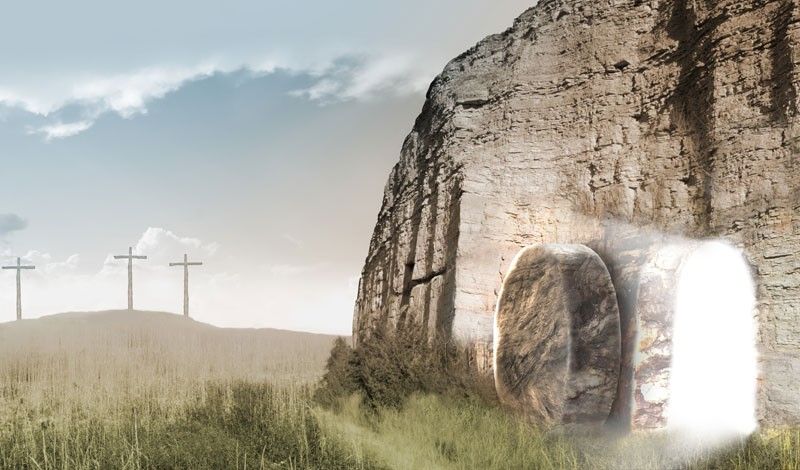The thief

This is Resurrection Day, the last of the Holy Week observance. No one would probably go out somewhere for contemplation or religious activity. Checkpoints won’t allow that. That leaves us no choice but the place where we are right now. But to contemplate we must.
Stark reality
I always look forward to going to two memorial parks at certain times of the year to visit my mother and a friend, RZ. Their graves each has a tree nearby, affording us a shade to reminisce memories that have never left. Gazing around, you see someone or two being laid to rest — permanently. Gloom, tears, because someone has been taken away, never to return. Death claims what is not his.
Ahh, the brevity of life, just a matter of when.
Why is it we could hardly talk about death? It makes anyone uneasy, that’s why. As it is, you are going to talk about pain, suffering, separation, misery, an end to all.
Today, death is roaming in almost every nation of the world. A rampaging disease is forcing everyone indoors. Threat to life is very real. No one is safe.
But Holy Week is about death. A most significant death, because Death died when Jesus died.
The Golgotha conversation
Here are three men in a most uncomfortable situation talking about impending death in a hill called Golgotha (“skull” in Aramaic). At first, the two were mocking Jesus like those who conspired to have the innocent man condemned. Finally, coming to the close of their conversation, one of the two said, “If you are the Christ, save yourself and us.” This thief had seen Christ’s miracles as thousands did. A miracle by Christ could be the last means of getting off the cross. But the other answered, and rebuking him said, “Do you not even fear God, since you are under the same sentence of condemnation? And we indeed are suffering justly, for we are receiving what we deserve for our deeds; but this man has done nothing wrong.” And he said, “Jesus, remember me when You come in Your kingdom!” And He (Jesus) said to him, “Truly I say to you, today you shall be with Me in Paradise.” (Luke 23:39-43)
That ended the conversation, then a few minutes later, the three died one after the other.
What is death?
Merriam-Webster defines it as “a permanent cessation of all vital functions: the end of life” to which the Stanford Encyclopedia of Philosophy adds “…irreversible loss of personhood.” Any human being knows a better definition of death because it is universal, with its collateral damage of breaking lives, loss of a future, unrealized contributions to other human beings and to society. Death is cruel; at times, senseless.
Today, death is on a rampage through the COVID monster. Modern technology has afforded us a kind of death clock. At certain times of the day, we are presented with official tally of cases, and deaths from almost every nation on Earth. Governments and the scientific world are frantically looking for a way to effectively stop the unseen assailant.
What’s a virus?
Like a virus (Latin, “poison”), death is not alive. But it is powerful, destructive. Let’s see first what a virus is.
“For about 100 years, the scientific community has repeatedly changed its collective mind over what viruses are. First seen as poisons, then as life forms, then biological chemicals. Viruses today are thought of as being in a gray area between living and non-living: they cannot replicate on their own but can do so in truly living cells and can also affect the behavior of their hosts profoundly. The categorization of viruses as non-living during much of the modern era of biological science has had an unintended consequence: it has led most researchers to ignore viruses in the study of evolution. Finally, however, scientists are beginning to appreciate viruses as fundamental players in the history of life” (excerpt from Are viruses alive? by Luis Vllareal, originally published in The Scientific American, Dec. 2004).
The cure
Like a virus, (original) sin entered the human race when God told the first couple, “In the day you eat of it, you shall surely die.” Die they did, because of disobedience. Separated from God, decay soon started in the body, the mind became evil with the heinous crime of murder committed in the first family. Of this entrance of sin, the Apostle Paul said, “Therefore, just as through one man’s sin entered into the world, and death through sin, and so death spread to all men, because all sinned… even so grace would reign through righteousness to eternal life through Jesus Christ our Lord. Rom. 5:12, 21
Three times in his public ministry, Christ predicted his death. He was looking forward to it — the true purpose of his coming. And when he has risen from the dead and appeared before the apostles and other followers, some of whom were doubting. He said to them, “These are My words which I spoke to you while I was still with you, that all things which are written about Me in the Law of Moses and the Prophets and the Psalms must be fulfilled.” Then He opened their minds to understand the Scriptures, and He said to them, “Thus it is written, that the Christ would suffer and rise again from the dead on the third day, and that repentance for forgiveness of sins would be proclaimed in His name to all the nations, beginning from Jerusalem. You are witnesses of these things.” Luke 24:44-48
Paul the apostle, once persecutor of the church, said, “For I delivered to you as of first importance what I also received, that Christ died for our sins according to the Scriptures, and that He was buried, and that He was raised on the third day according to the Scriptures, and that He appeared to Cephas, then to the 12. After that, He appeared to more than 500 brethren at one time, most of whom remain until now, but some have fallen asleep; then He appeared to James, then to all the apostles; and last of all, as to one untimely born, He appeared to me also. For I am the least of the apostles, and not fit to be called an apostle, because I persecuted the church of God.” 1Cor. 15:3-9. He became Jesus’ foremost missionary to the then known world, saying in a capsule, “For the wages of sin is death, but the free gift of God is eternal life in Christ Jesus our Lord.” Romans 6:23
In his own words, Jesus Christ said, “For God so loved the world, that He gave His only begotten Son, that whoever believes in Him shall not perish, but have eternal life.” John 3:16
The thief believed and received that promise.
For God so loved the world, that He gave His only begotten Son, that whoever believes in Him shall not perish, but have eternal life. – John 3:16
(All scriptures are from the New American Standard Bible)
- Latest























